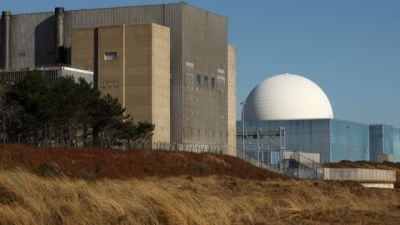Government confirms £700m deal for Sizewell C nuclear plant and sets up Great British Nuclear

The government has confirmed the go-ahead for the new Sizewell C nuclear power plant in Suffolk, backing the scheme with a £700m stake - and announcing plans for future nuclear projects.
The move, which ministers said would create 10,000 highly skilled jobs and provide reliable low-carbon power to the equivalent of six million homes for more than 50 years, is part of efforts to secure UK energy security.
Ministers also said they would set up an arms-length body, Great British Nuclear, which would develop a pipeline of nuclear projects beyond Sizewell C.
The plant on the Suffolk coast, developed by French energy giant EDF, will be the second of a new generation of nuclear power reactors, after the delayed Hinkley Point C scheme in Somerset which is under construction, but has seen costs climb since it was first given the go-ahead.
It is expected to cost between £20bn and £30bn.
EDF’s chief executive, Simone Rossi, said replicating Hinkley Point C’s design at Sizewell would provide more certainty over schedule and costs, adding: “It will deliver another big boost to jobs and skills in the nuclear industry and provide huge new opportunities for communities in Suffolk”.
The announcement comes after ministers also set out plans to reduce energy demand by 15% by 2030, with a new £1bn Eco+ energy efficiency scheme, and a public awareness campaign – previously blocked under Liz Truss’s administration as being too “nanny state” – to help save energy this winter.
It also comes as Prime Minister Rishi Sunak is facing pressure, including from some Tory MPs, to U-turn on plans to keep the ban on onshore wind farms in England – one of the cheapest forms of energy.
Business and Energy Secretary Grant Shapps said: “Global gas prices are at record highs, caused by Putin’s illegal march on Ukraine.
“We need more clean, affordable power generated within our borders – British energy for British homes.
“Today’s historic deal giving government backing to Sizewell C’s development is crucial to this, moving us towards greater energy independence and away from the risks that a reliance on volatile global energy markets for our supply comes with.”
Opponents of the new reactor said they would not give up in their efforts to see the project scrapped.
A spokesman for the group Stop Sizewell C said: "Sizewell C can neither lower energy bills nor give the UK energy independence. Despite the government's paltry £700m, there is still a huge amount of money to find, and no one is prepared to come clean about what the ultimate cost will be.
"Its only chance of securing finance is if the government bribes private investors by foisting the huge cost and inevitable overruns of this lengthy and technically flawed project onto consumers, by adding an extra nuclear tax on energy bills.
"But Sizewell C may have to rely on overseas investors who would pocket UK households' hard-earned cash. With a French developer, overseas owners and foreign uranium fuel, the claim of energy 'freedom' looks pretty hollow."
The Chancellor Jeremy Hunt, who announced the intention to push ahead with the project in the autumn statement, said: “Today’s investment in Sizewell C represents the biggest step on our journey to energy independence – the first state backing for a nuclear project in over 30 years.
“Once complete, this mega project will power millions of homes with clean, affordable, home-grown energy for decades to come.
“Together with our drive to improve the nation’s energy efficiency, this package will help to permanently bring down energy bills and stop Britain being at the mercy of global gas prices beyond our control.”
Downing Street on Tuesday declined to get into specific details about the exit of China General Nuclear from the project or the size of the buy-out costs.
Asked if the government could rule out Chinese involvement in future nuclear energy projects, the prime minister’s official spokesman said: “I think we would need to make a judgement on what is right for the UK.
He said that the government “certainly wouldn’t do anything that put UK security at risk and indeed our focus is on enhancing our energy independence”.
Want a quick and expert briefing on the biggest news stories? Listen to our latest podcasts to find out What You Need To Know